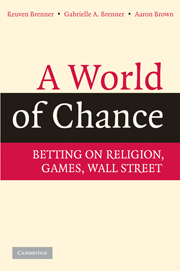Book contents
- Frontmatter
- Contents
- Preface
- Acknowledgments
- 1 From Religion to Risk Management: What to Do When Facing Uncertainty?
- 2 Anything Wrong with Gambling as a Pastime?
- 3 Are You Rich? Risk-Taking and Gambling, or the Leapfrogging Instinct
- 4 Betting on Futures and Creating Prices
- 5 Gambling as Banking: Poker, Junk Bonds, and Central Banks
- 6 Lottery Is a Taxation, and Heav'n Be Prais'd, It Is Easily Rais'd
- 7 Politics and Prohibitions; or, What's a Good Tax Anyway?
- 8 How Gamblers and Risk-Takers Correct the Future
- Appendix 1 Gambling and Risk-Taking: The Leapfrogging Instinct
- Appendix 2 Human Nature and the Civilizing Process
- Appendix 3 A Statistical Profile of Gamblers
- Notes
- Bibliography
- Name Index
- Subject Index
Preface
Published online by Cambridge University Press: 06 July 2010
- Frontmatter
- Contents
- Preface
- Acknowledgments
- 1 From Religion to Risk Management: What to Do When Facing Uncertainty?
- 2 Anything Wrong with Gambling as a Pastime?
- 3 Are You Rich? Risk-Taking and Gambling, or the Leapfrogging Instinct
- 4 Betting on Futures and Creating Prices
- 5 Gambling as Banking: Poker, Junk Bonds, and Central Banks
- 6 Lottery Is a Taxation, and Heav'n Be Prais'd, It Is Easily Rais'd
- 7 Politics and Prohibitions; or, What's a Good Tax Anyway?
- 8 How Gamblers and Risk-Takers Correct the Future
- Appendix 1 Gambling and Risk-Taking: The Leapfrogging Instinct
- Appendix 2 Human Nature and the Civilizing Process
- Appendix 3 A Statistical Profile of Gamblers
- Notes
- Bibliography
- Name Index
- Subject Index
Summary
Which explains the unusual origins and approach of this book.
The next best thing to a guaranteed good future – if such a guarantee exists – is a chance to it.
How some societies created far more chances for their members than did others is the story that we tell in this book from an unusual, though to us logical, angle. That angle involves looking at the question through the prism of games of chance, of futures and of financial markets, and of the ways people have acted when facing a variety of risks and then deciding to leap into the unknown. It turns out that gamblers and risk-takers brought to life businesses and institutions that allowed the rest of society to have more options. It also turns out that though financial markets often tried to distance themselves from gambling, the two have far more in common than is usually thought. And there is nothing wrong with that.
When there were no financial institutions – as we view them today – such as banks, lotteries were the ways in which both relatively expensive items were disposed of and governments raised money quickly. Gambling tables often fulfilled roles similar to venture capital and banking today. Gamblers created the clearinghouses and also sustained liquidity. When they bet on price distributions, however, they were suddenly redefined as speculators. Today they are called hedge fund managers or bankers. Closer inspection reveals that though the words changed, the actions these parties undertook stayed the same.
- Type
- Chapter
- Information
- A World of ChanceBetting on Religion, Games, Wall Street, pp. xiii - xviPublisher: Cambridge University PressPrint publication year: 2008



